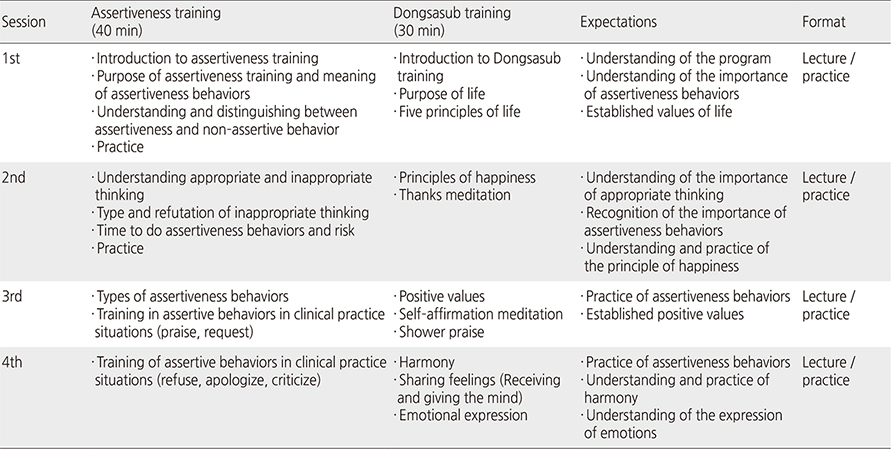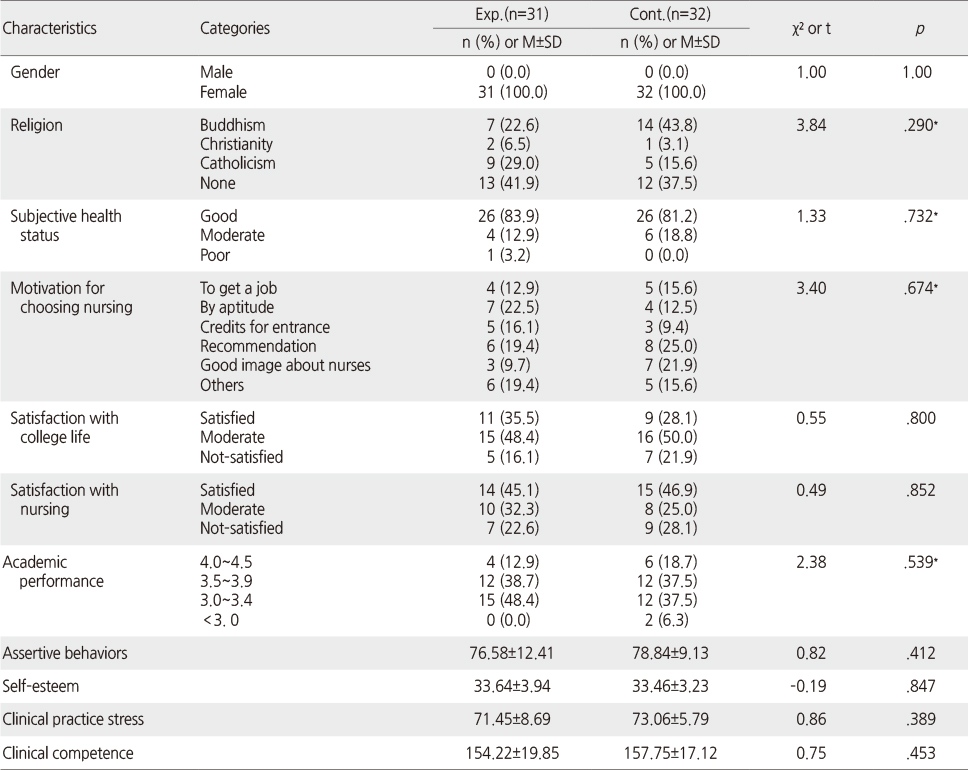Articles
- Page Path
- HOME > J Korean Acad Nurs > Volume 46(4); 2016 > Article
-
Original Article
- Development and Effects of Assertiveness Training applying Dongsasub Training for Nursing Students in Clinical Practice
- Myoungsuk Kim
-
Journal of Korean Academy of Nursing 2016;46(4):490-500.
DOI: https://doi.org/10.4040/jkan.2016.46.4.490
Published online: August 31, 2016
College of Nursing, Sungshin Women's University, Seoul, Korea.
- Address reprint requests to: Kim, Myoungsuk. College of Nursing, Sungshin Women's University, Mia Woonjung Green Campus, 55 Dobong-ro 76ga-gil, Gangbuk-gu, Seoul 01133, Korea. Tel: +82-2-920-2712, Fax: +82-2-920-2092, cellylife@gmail.com
© 2016 Korean Society of Nursing Science
This is an Open Access article distributed under the terms of the Creative Commons Attribution NoDerivs License. (http://creativecommons.org/licenses/by-nd/4.0/) If the original work is properly cited and retained without any modification or reproduction, it can be used and re-distributed in any format and medium.
Abstract
-
Purpose
- This study was conducted to develop assertiveness training applying Dongsasub training for junior nursing students, and to verify effectiveness of the training on assertiveness behavior, self-esteem, clinical practice stress, and clinical competence.
-
Methods
- The study design was a non-equivalent control group non-synchronized design. Participants were 63 nursing students in clinical training (31 students in the experimental group and 32 students in the control group). The assertiveness training applying Dongsasub training consisted of four sessions. Outcome variables included assertiveness behavior, self-esteem, clinical practice stress, and clinical competence. Data were analyzed using Chi-square, Fisher's exact test and independent samples t-test with SPSS/WIN 21.0.
-
Results
- Scores of assertiveness behavior (t=-2.49, p=.015), self-esteem (t=-4.80, p<.001) and clinical competence (t=-2.33, p=.023) were significantly higher and clinical practice stress (t=4.22, p<.001) was significantly lower in the experimental group compared to the control group.
-
Conclusion
- Results indicate that the assertiveness training applying Dongsasub training can be used as a nursing intervention to lower clinical practice stress and improve the clinical competence of nursing students.
- 1. Rosenberg M. Society and the adolescent self-image. Princeton, NJ: Princeton University Press; 1965.
- 2. Sung KW, Kwag OG, Lee WH. Comparison of anger expression, assertive behavior, and self-esteem between a nursing student group and an educational student group. J Korean Acad Community Health Nurs. 2010;21(1):1–11. Article
- 3. Park JW, Ha NS. Nursing students' clinical experiences. J Korean Acad Psychiatr Ment Health Nurs. 2003;12(1):27–35.ArticlePDF
- 4. Edwards D, Burnard P, Bennett K, Hebden U. A longitudinal study of stress and self-esteem in student nurses. Nurse Educ Today. 2010;30(1):78–84. ArticlePubMed
- 5. Kim HS. A study on relationship between stress of clinical practice and clinical competency in nursing students. J Korean Public Health Nurs. 2002;16(1):64–76.
- 6. Park GO, Kim YS. Stress of clinical practice, self-concept, mental health of nursing students. J Korean Data Anal Soc. 2013;15(4):2149–2163.
- 7. Kim SL, Lee JE. Relationship among stress, coping strategies, and self-esteem in nursing students taking clinical experience. J Korean Acad Soc Nurs Educ. 2005;11(1):98–106.
- 8. Jung M, Kang H. Nursing students' self esteem, assertiveness and interpersonal relationship according to their style of conflict management. J Korean Acad Soc Nurs Educ. 2014;20(3):345–352. Article
- 9. Park SY. The effects of assertiveness traning and value clarification training on nurse's conflict and conflict management mode. J Muscle Joint Health. 1995;2(1):41–72.
- 10. Jang IS, Kim JN. Effects of assertiveness training on assertiveness behavior, problem solving ability, and interpersonal relationships of nursing college students. J Korean Community Nurs. 2002;13(2):239–248.
- 11. Rhee IS. The effects of assertive training on assertive behavior, self-esteem and interpersonal stress of nursing students[master's thesis]. Daejeon, Chungnam National University. 1990;1–51.
- 12. Ünal S. Evaluating the effect of self-awareness and communication techniques on nurses' assertiveness and self-esteem. Contemp Nurse. 2012;43(1):90–98. ArticlePubMed
- 13. Cho YA, Kim KS. Effects of assertiveness training for ICU nurses. J Korean Clin Nurs Res. 2013;19(2):255–264.
- 14. Nishina Y, Tanigaki S. Trial and evaluation of assertion training involving nursing students. Yonago Acta Med. 2013;56(3):63–68.PubMedPMC
- 15. Park SH. Dongsasub counseling. Seoul: Hakjisa Corp.; 2007.
- 16. Kim M, Song M. Effects of self-management program applying Dongsasub training on self-efficacy, self-esteem, self-management behavior and blood pressure in older adults with hypertension. J Korean Acad Nurs. 2015;45(4):576–586. ArticlePubMedPDF
- 17. Yang JJ. The effectiveness of assertive training on the state anxiety and assertive behavior of nursing students experiencing clinical practice training. J Korean Acad Soc Nurs Educ. 2001;7(1):54–67.
- 18. Kirkpatrick H, Forchuk C. Assertiveness training: Does it make a difference? J Nurs Staff Dev. 1992;8(2):60–65.PubMed
- 19. Chang HC. A study on self-esteem through dong-sa-sub, spiritual group counseling program[master's thesis]. Seoul, Yonsei University. 2003;1–70.
- 20. Rakos RF, Schroeder HE. Self-directed assertiveness training. New York, NY: Bio Monitoring Applications; 1980.
- 21. Kim SH. The effects of assertiveness training on assertiveness· behavior of high school students. J Stud Guid. 1982;15(2):1–30.
- 22. Jon BJ. Self-esteem: A test of its measurability. Yonsei Nonchong. 1974;11(1):107–130.
- 23. Beck DL, Srivastava R. Perceived level and sources of stress in baccalaureate nursing students. J Nurs Educ. 1991;30(3):127–133.ArticlePubMed
- 24. Lee WH, Kim CJ, Yoo JS, Her HJ, Kim KS, Lim SM. Development of a clinical competency measurement tool for student. Yonsei J Nurs Sci. 1990;13:17–29.
- 25. Choi MS. A study on the relationship between teaching effectiveness of clinical education and clinical competency in nursing students[master's thesis]. Seoul, Ehwa Womans University. 2005;1–70.
- 26. Lee S, Crockett MS. Effect of assertiveness training on levels of stress and assertiveness experienced by nurses in Taiwan, Republic of China. Issues Ment Health Nurs. 1994;15(4):419–432.PubMed
- 27. Park HS, Bae YJ. A study on self-esteem, self-efficacy, coping methods, and the academic and job-seeking stress of nursing students. J Korean Acad Psychiatr Ment Health Nurs. 2002;11(4):621–631.ArticlePDF
- 28. Seo BM, Park HJ. Factors affecting clinical competence among nursing students. Korean J Health Serv Manag. 2014;8(4):149–161. Article
- 29. Park JH, Chung SK. The relationship among self-esteem, empathy, communication skill and clinical competency of nursing students. J Korea Acad Ind Coop Soc. 2015;16(11):7698–7707. Article
- 30. Kukulu K, Buldukoğlu K, kulakaç Ö, Köksal CD. The effects of locus of control, communication skills and social support on assertiveness in female nursing students. Soc Behav Pers. 2006;34(1):27–40. Article
REFERENCES
Figure & Data
REFERENCES
Citations

- The effect of verbal violence, clinical practice stress, and coping with stress on nursing students’ major satisfaction during clinical practice
Heejung Heo, Yeoungsuk Song
The Journal of Korean Academic Society of Nursing Education.2023; 29(2): 190. CrossRef - Imagine All the People: A Guided Internet-Based Imagery Training to Increase Assertiveness among University Students—Study Protocol for a Randomized Controlled Trial
Micaela Di Consiglio, Jessica Burrai, Emanuela Mari, Anna Maria Giannini, Alessandro Couyoumdjian
Healthcare.2023; 11(13): 1874. CrossRef - A structural model of nursing students’ performing communication skills
Cho Rong Gil, Kyung Mi Sung
The Journal of Korean Academic Society of Nursing Education.2023; 29(2): 148. CrossRef - Effect of Clinical Practice Stress and Anger Expression on Assertive Behavior in Nursing Students
Eun-Ju LEE, Gyu-Li BAEK
JOURNAL OF FISHRIES AND MARINE SCIENCES EDUCATION.2022; 34(1): 104. CrossRef - Effectiveness of assertiveness training, SBAR, and combined SBAR and assertiveness training for nursing students undergoing clinical training: A quasi-experimental study
Gie Ok Noh, Myongsuk Kim
Nurse Education Today.2021; 103: 104958. CrossRef - Educational Needs of Communication among Nursing Students
Min Young Jung, Jeongyee Bae
Journal of Korean Academy of Psychiatric and Mental Health Nursing.2019; 28(1): 91. CrossRef - The Impacts of Assertiveness on Attitudes toward Nurse-Physician Collaboration in Nursing Students
Sang Min Lee, Young Ho Ryu, Ju Hyun Kim
Journal of Korean Academic Society of Nursing Education.2018; 24(4): 326. CrossRef

Figure 1
Assertiveness Training applying Dongsasub Training for This Study
Homogeneity Test of Characteristics and Dependent Variables between Two Groups (N=63)
*Fisher's exact test; Exp.=Experimental group; Cont.=Control group; SD=Standard deviation.
Comparison of Dependent Variables between Two Groups after Treatment (N=63)
Exp.=Experimental group; Cont.=Control group; SD=Standard deviation.
*Fisher's exact test; Exp.=Experimental group; Cont.=Control group; SD=Standard deviation.
Exp.=Experimental group; Cont.=Control group; SD=Standard deviation.
 KSNS
KSNS
 E-SUBMISSION
E-SUBMISSION




 Cite
Cite

